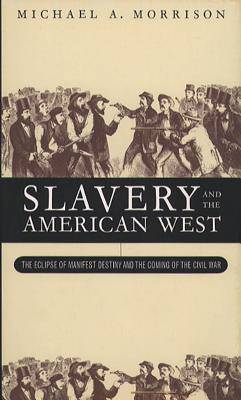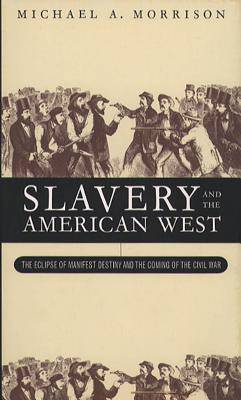
Je cadeautjes zeker op tijd in huis hebben voor de feestdagen? Kom langs in onze winkels en vind het perfecte geschenk!
- Afhalen na 1 uur in een winkel met voorraad
- Gratis thuislevering in België vanaf € 30
- Ruim aanbod met 7 miljoen producten
Je cadeautjes zeker op tijd in huis hebben voor de feestdagen? Kom langs in onze winkels en vind het perfecte geschenk!
- Afhalen na 1 uur in een winkel met voorraad
- Gratis thuislevering in België vanaf € 30
- Ruim aanbod met 7 miljoen producten
Zoeken
Slavery and the American West
The Eclipse of Manifest Destiny and the Coming of the Civil War
Michael A Morrison
Paperback | Engels
€ 81,95
+ 163 punten
Omschrijving
Tracing the sectionalization of American politics in the 1840s and 1850s, Michael Morrison offers a comprehensive study of how slavery and territorial expansion intersected as causes of the Civil War. Specifically, he argues that the common heritage of the American Revolution bound Americans together until disputes over the extension of slavery into the territories led northerners and southerners to increasingly divergent understandings of the Revolution's legacy. Manifest Destiny promised the literal enlargement of freedom through the extension of American institutions all the way to the Pacific. At each step -- from John Tyler's attempt to annex Texas in 1844, to the Kansas-Nebraska Act, to the opening shots of the Civil War -- the issue of slavery had to be confronted. Morrison shows that the Revolution was the common prism through which northerners and southerners viewed these events and that the factor that ultimately made consensus impossible was slavery itself. By 1861, no nationally accepted solution to the dilemma of slavery in the territories had emerged, no political party existed as a national entity, and politicians from both North and South had come to believe that those on the other side had subverted the American political tradition.
Specificaties
Betrokkenen
- Auteur(s):
- Uitgeverij:
Inhoud
- Aantal bladzijden:
- 416
- Taal:
- Engels
Eigenschappen
- Productcode (EAN):
- 9780807847961
- Verschijningsdatum:
- 30/08/1999
- Uitvoering:
- Paperback
- Formaat:
- Trade paperback (VS)
- Afmetingen:
- 157 mm x 235 mm
- Gewicht:
- 603 g

Alleen bij Standaard Boekhandel
+ 163 punten op je klantenkaart van Standaard Boekhandel
Beoordelingen
We publiceren alleen reviews die voldoen aan de voorwaarden voor reviews. Bekijk onze voorwaarden voor reviews.









